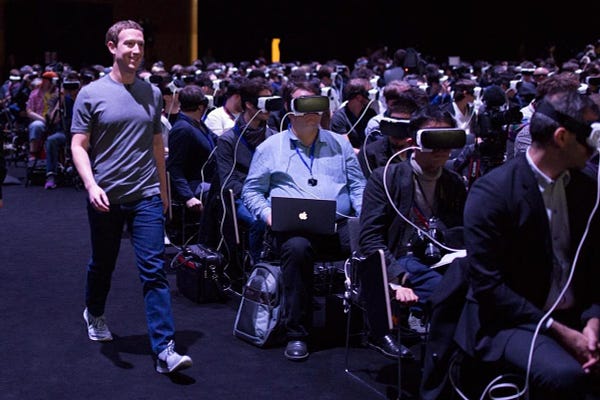Things will never get meta: Mark Zuckerberg wants to build an artificial world? The British media does that daily...
Look at today's newspapers and ask yourself: Does that look like reality?
Programming note: Sorry for the absence of Thursday and Friday’s newsletters. I was getting ready for my wedding on Friday, which led to me simply running out of time. Thursday’s lost edition would have been about Rishi Sunak and the coverage of the budget. I can sum it up like this:
Newspapers howling that it was a “Labour budget” are engaged in yet another remodelling of the Overton Window, which has already been reduced to the size of churlishly-proportioned cat flap.
Friday’s edition has been folded into the bumper Saturday/Sunday edition which follows…
On Thursday, Mark Zuckerberg — a man who desperately wishes his dick had a USB charging point — announced a name change for the holding company which contains Facebook, Instagram, WhatsApp and Oculus like a bucket full of writhing tentacles. It will now be called Meta and focus on Zuckerberg’s lunatic vision of the metaverse, which bloomed during the lockdowns of 2020 and 2021.
In my latest column for Perspective (filed before the Meta reveal), I wrote about the history of the metaverse as an idea, stretching back to the concepts put forward in Vannevar Bush’s 1945 essays As We May Think, which included the notion of “the Memex” (a single device that could store books, records, and communications in a single place and draw links between them). There’s a good chance you’re reading this on the Memex you carry around in your pocket.
In a long and decidedly credulous piece about Zuckerberg’s Meta dreams, The Verge describes his vision of the future as:
… most people will be spending time in a fully immersive, 3D version of the internet that spans not just Meta’s hardware such as the Quest [VR headset], but devices made by others. He’s pushing his teams to build technology that could one day let you show up in a virtual space as a full-bodied avatar, or appear as a hologram of yourself in the real-world living room of your friend who lives across the planet.
… he believes there will be a “pretty important role” for crypto technology like NFTs and smart contracts in the metaverse.
Neal Stephenson coined the word “metaverse” in his 1992 novel Snow Crash to describe a sprawling virtual world where commerce, entertainiment, socialising, spying, and killing can take place. In the same book, Stephenson used the word “avatar” — originally a Hindu term for the terrestrial forms chosen by deities — for the first time to mean virtual representations of real people.
In Snow Crash people turn to the metaverse because the ‘real’ world is a dystopian mess and the class distinctions in the outside world are replicated and twisted in the virtual one. Stevenson’s punningly-named main character, Hiro Protagonist, is a delivery driver (and gig-working intelligence agent) in the ‘real’ world and an elite hacker with super-user privileges in the metaverse; the rich and powerful as well as those who know how to exploit the system — like Hiro — have incredibly realistic avatars while most people are forced to use off-the-shelf versions that indicate their social class even in the virtual world.

Zuckerberg knows that Snow Crash was not even remotely a utopian vision but he still cannot escape the irony of trying to deal with the crumbling real world (and the inevitable decline of his existing virtual fiefdom Facebook) by promising a new and better one into which people can retreat. That, as Ryan Broderick noted in an edition of his Garbage Day newsletter this week…
… there is no version of that where Facebook, or Meta, will be a key player. It is simply too big for them to dominate and, more importantly, it is already happening on Twitch, on Discord, and on TikTok…
… can and will never be something that Zuckerberg can admit. A glib way of looking at Facebook is as the ‘enemy’ of traditional media beasts like Rupert Murdoch, but Zuckerberg has more in common with those monopoly-chasing, market-crushing old operators than he once did.
Zuckerberg has been attending Allen & Co’s Sun Valley conference alongside other billionaires including Murdoch for years now. His gawky hoodie-wearing flat affect is a distraction, as are recent moves to frame Priscilla Chan — his wife and CEO of the reputation-washing Chan Zuckerberg Initiative — as his “moral compass” (as a well-lubricated toejob of a Times profile put it last week).
The Meta shift at Facebook1 is a transparent attempt to maintain control and relevance. While the trappings of Zuckberg’s visions — promises of holograms and virtual worlds that feel increasingly real — are very different to the stories that ‘old’ media companies tell us, the underlying impulses are not.
The newspaper is a 300-year-old piece of technology but it and its modern online incarnations do what Zuck wants to achieve with his metaverse: They present a version of our reality mediated through the wants and desires of a small number of proprietors but presented as a shared truth.
Every day the British newspapers and wider media present an alternate reality. It’s one that looks a lot like the world we all live in but with the contrast turned up to eye-bleeding levels, and almost every occurence a shame, a scandal, a row, or an outrage.
Take for example this week’s attempt to turn ongoing disputes over the issuing of fishing licences around Jersey into a literal war between the UK and France.
On Friday, Politico London Playbook editor and (alleged) godfather to the Prime Minister’s son Wilfred, Alex Wickham, acquired a letter from the French Prime Minister Jean Castex to the European Commission President Ursula Von Der Leyen. Translating in wildly bad faith, Wickham and Politico took the line:
Il est indispensable de montrer clairement aux opinions publiques europénnes que le respect des engagements souscrits n'est pas négociable et qu'il y a davantage de dommage a quitter l'Union qu'a y demeurer.
… and rendered it as:
It is indispensable to demonstrate to European public opinion that more damage is suffered by leaving the EU than by remaining.
A fairer translation would be something like:
It’s essential to show European public opinion that commitments entered into are not negotiable and that there are more costs to leaving the EU than remaining within it.
It’s a bluntly expressed sentiment but hardly a surprising one: The EU nations are united by a belief that being part of that union makes them stronger and that leaving it is not without consequence. Castex is simply saying that France expects the UK to honour deals it has made and the EU to support that.


It’s notable that Wickham went far harded on the so-called “punishment” line than the one earlier in the letter where Castex says:
It seems necessary for the European Union to show its full determination to obtain full compliance with the agreement by the United Kingdom and assert its rights by using the levers at its disposal in a firm, united and proportionate manner.
Once Wickham — a former Muttley to drink driving enthusiast Paul Staines’ Dick Dastardly (Licence Suspended Variant) — had put the distorted line out it was there to be grabbed and hyped up by the usual suspects. So we have The Daily Telegraph front page howling UK must be punished for Brexit, says France, a line that is then repeated by political shows on TV and radio, and will be followed up in the Sunday papers.
The more nuanced line from a Financial Times interview with French president Emmannuel Macron (also a front page story) that…
…when you spend years negotiating a treaty and then a few months later you do the opposite of what was decided on the aspects that suit you the least, it is not a big sign of your credibility.
Don’t be under any illusion that I’ve contracted #FBPE brain and suddenly believe that the EU, and the French particularly, are not capable of engaging in a bit of mauvaise foi. In an election year there are clearly advantages for Macron to be seen to be standing up to les rosbifs.
But the glee in the British tabloids — and The Telegraph is just a tabloid with a superiority complex — at the prospect of a ‘war’ with the French and Boris Johnson’s government “summoning the ambassador” is pathetic.

Inevitably The Sun — always desperate to wrap itself in a Union Flag while its Australia-turned-American owner laughs like Doctor Claw — reaches for a World War II pun (“Clambusters”) and screeches “France begs UK to back them in fishing war against Britain — as punishment for Brexit”. From Wickham and co’s deliberately clumsy translation to war-drum beating headlines within hours. it’s the British media’s alternate reality machine operating at full power.
See also: Giles Coren turning a debate about the relatively low number of novels by male authors into yet another howl of self-pity. His latest column hinges on the idea that the response to his novel — which sold south of 800 copies in total — is proof that men are simply wasting their time with the medium:
Even my own 2005 novel, Winkler, was no sooner in print than winning the Bad Sex Award. Three years of effort, some perfectly decent words in roughly the right order, and all I got was a load of raspberries blown by a roomful of plummy virgins who’d only come for the free soave and strippers. Scorn and mockery, boys, scorn and mockery. That’s all there is in the novelist’s life.
The passage that clinched the Bad Sex Award for Coren — the one prize aside from Britain’s Most Justified Victim of Car Theft that he truly deserves — is quoted below. Please do not read it while eating:
And he came hard in her mouth and his dick jumped around and rattled on her teeth and he blacked out and she took his dick out of her mouth and lifted herself from his face and whipped the pillow away and he gasped and glugged at the air, and he came again so hard that his dick wrenched out of her hand and a shot of it hit him straight in the eye and stung like nothing he'd ever had in there, and he yelled with the pain, but the yell could have been anything, and as she grabbed at his dick, which was leaping around like a shower dropped in an empty bath, she scratched his back deeply with the nails of both hands and he shot three more times, in thick stripes on her chest. Like Zorro.
Like Zorro.
Just as he did in two weeks ago when he pretended that he “as a privileged straight white male” faced imminent ‘cancellation’ and must jokingly consider a career change to burglary2 Coren ended this week’s column in self-pitying style:
… if there’s no money in novel writing any more, no power, no respect, no sex and no immortality, well then I say we leave it to the ladies. As long as we’ve got our HGV licences and our jazz mags, we’ll be fine.
Will Self thinks the novel is dead because people have finally grown tired of him chewing up then spitting out the dictionary in haphazard fashion and Giles Coren thinks novels are a woman’s game because his was so abject.
Dive into the alternative reality of The Times’ archive however and you’ll find that Winkler was, according to the review of the hardback edition by Neel Mukherjee, full of “brio and ludic energy”, while Christina Konig’s paperback review concluded that it had “much to recommend it”. Not even the support his employers, a series of features leading up to publication, and his famous name could prevent Giles Coren’s dreadful novel from flopping. He failed to make his mark… unlike Zorro.
But in the alternate universe of the British media, Coren’s failed novel was not a black mark on his reputation. It did nothing to prevent him receiving further commissions and, in fact, was the subject of his 2015 Sky documentary Giles Coren: My Failed Novel, in which Rose Tremain, David Mitchell3 and Hanif Kureishi each wasted their time trying to teach him where he went wrong.
Coren will never learn because he is insulated from the consqeuences of his actions. When he posted tweets laughing at Dawn Foster’s death, his editors at The Times closed comments under his pieces and he sailed on without censure, offering no apology or public comment.
It’s a similar situation with William Sitwell, a man we were assured had been ‘cancelled’ by the ‘woke left’ after he resigned as editor of Waitrose Food Magazine for responding to a freelancer’s pitch on plant-based recipes by suggesting a series on “killing vegans, one by one". He’s still commissioned widely with his latest missive for The Daily Telegraph dedicated to his joy at dressing up in his great aunt Edith Sitwell’s clothes. Which is a very normal thing for a child to do unless it happens in a John Lewis advert.
On the same day that Sitwell was writing about “[wearing] Edith’s cape… to enhance the escapades that went with a weekend with friends, hitting the cocktails,” Juliet Samuels howled a few pages later that John Lewis’s woke advert is a sign of a deeper malaise at the troubled retailer. Her rage followed a previous barrage of columns from the paper on this single John Lewis campaign, with the most deranged of them a contribution from Judith Woods headlined Why the new John Lewis advert is everything that’s wrong with modern Britain
Ahead of the clocks going back today, Peter Hitchens’ published his yearly howl at the “state sponsored clock-twiddling”. He’s been waging this one-man guerilla campaign for years, offering perhaps his greatest salvo in a 2015 Mail piece which argued:
Tomorrow morning, all official time sources from Big Ben to the BBC will be lying about the time, and if you have any sense, all the myriad clocks in your home will be lying too…
In the metaverse of Peter Hitchens’ mind, the clocks are now lying, as the elite continues to deny the concept of “natural British time”.
But the Hitchens reality is only a minor offshoot of the British media metaverse compared to the madness that arrives with the start of War Christmas — the poppy season that now stretches from late-October through to late-November — when newspapers, radio stations, and TV shows alike begin a hunt for people who show most respect (usually a bloke who has converted his front garden into a replica of the Somme) and those who are inadequately respectful (generally an Irish footballer who doesn’t want to wear a poppy).
Of course watching Mark Zuckerberg turned into a pixellated version of himself in his dream world of “what if Zoom but you can never leave” is disturbing but if, like me, you spend most of your time in the depths of the British media’s delusions, it’s just a new flavour of a familiar nightmare.
As with Google after its parent company was renamed and restructed as Alphabet in 2015, people will continue to call Zuck’s empire “Facebook” whatever the official branding.
Which does make sense as he’s long been stealing a living.
The novellist rather than Coren’s comedian brother-in-law.









